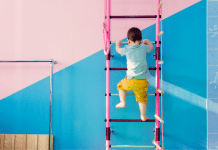
I knew something wasn’t right with my son a week after his first birthday. Something wasn’t clicking with his physical development.
By his first birthday, my son was not walking, which was no surprise. He’s a laid-back, easy-breezy second child with a directive and active big sister that caters to his every need. We knew he would need extra time, and perhaps a little nudge, to accomplish some baby milestones.
However, as I watched my husband maneuver the recently aged one-year-old into a standing position, his delightful baby giggles immediately turned to gut-wrenching wails.
Although I couldn’t be certain, I had the instinctual feeling that my son’s development was falling further behind.
He wouldn’t walk or stand, even when being supported. To this point, he hadn’t even crawled. Instead, relying solely on scooting from one place to another on his bottom.
Other (well-meaning) mothers told me to enjoy this extra time before he takes off running with mom and dad chasing behind, that blissful peace before he reaches new heights and subsequent dangers.
I must admit, it was a nice, albeit brief, period that we enjoyed his stationary position before the worry set in.
Naturally, we turn to our best-worst enemy for the answers… Google. Succumbing to the torrent of information on the internet, we quickly speculated on a whole myriad of potential problems: muscular issues, neurological issues, and an entire whirlwind of other disorders we were not qualified to assess. The scariest part was thinking, ‘did we miss something?’ We quickly recounted every milestone and checked each item off the list:
“How often does he roll from tummy to back or vice versa?
I know I’ve seen him do it.”
“When did he start pushing himself up to a sitting position? He barely does it.”
“He doesn’t crawl, just scoots about.
….but all the books say that’s ok, right?”
(We’ve now learned from his physical therapist that it’s not okay)
And, of course, the classic comparison trap… “did he have less tummy time than his sister? When did she crawl? Break out her baby book and video clips to see how he measures up. How far is too far behind?!”
Everyone we asked said he’s probably fine; the walking milestone is a wide spectrum, after all. His fine motor skills are impeccable, and he’s the happiest and most engaging baby. He’ll probably be fine.
I knew in my gut “probably fine” was not enough reassurance.
The *probably* kept getting louder and louder as the word continued to echo from our doctors, family members, and friends.
Was I the over-worried, helicopter mom, or was there an actual underlying issue that needed to be addressed?
I had to choose.
It was the height of COVID lockdowns. We felt alone and unprepared. We tried all sorts of techniques from various internet forums to help him.
Despite these efforts, I knew that a professional was needed. The pandemic made this endeavor difficult; however, the wonderful programs available worked diligently and digitally to make things happen.
The decision to reach out for help evolved into the best path for our son.
After qualifying for the Early Steps program and enrolling in physical therapy, we have worked with experts on mobility for a year. My son has learned to take independent steps from learning to crawl, push up to seated, squat, and cruise. He is still working through his low muscle tone and sensory processing to catch up to his peers in gross motor skills. He was 2-years-old (and a day) the first time I saw him walk towards me, by himself, across his preschool room.
I cried. Dad cried. His teacher cried. He grinned.
I’ll never forget the enormous satisfaction on his face following the many months of work, sweat, and tears he put into those first few steps.
As moms, we are given so much advice, much of which is greatly appreciated. However, with so much information, I found it difficult to rifle through the ‘stuff‘ that applies to our particular situation. The ultimate lesson from this experience encouraged me to be confident in pursuing what is best for my child and reaching out for help. To discern what he needs and to make it happen.
I’ve learned to be more patient, to understand capabilities, and to push limits. I’m thankful for the experience and how it’s given me greater tools to be a better parent for both my children.















This article is wonderful. As a pediatric PT and a mom of two grown sons, I can say the information here will be of great help to many. When my older son struggled with speech, I know the confusion and doubt one feels searching for help and answers. I’m thankful you found Early Steps and got the correct assistance so your son could move forward.
Thanks for sharing your heart!
Thank you SO much! I have learned so much from my pediatric PT and have such a new perspective and appreciation for the hard work and challenges in that field. Learning how PT, OT, and speech work hand in hand in early development is fascinating. Thank you for the work that you do!
Thanks Mallory. What an awesome testimony for Early Steps. May success continue in the future!!!☺
It’s been wonderful! Proud to have a new graduate 🙂
[…] myself (pretty often) that each and every child is different. They all have their own timelines for development and we shouldn’t compare them to one […]